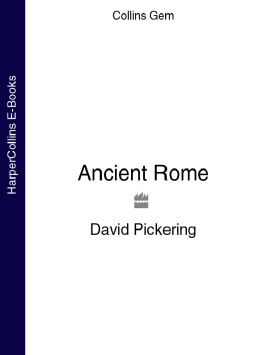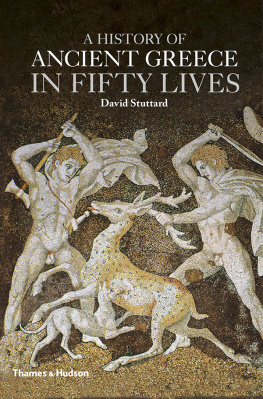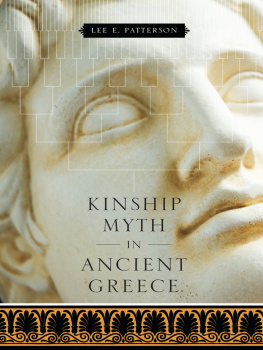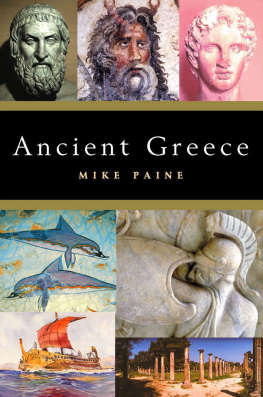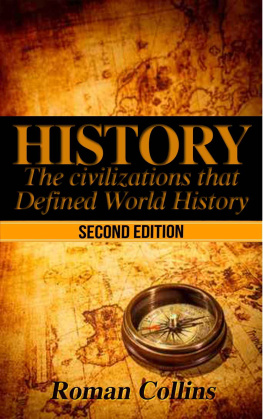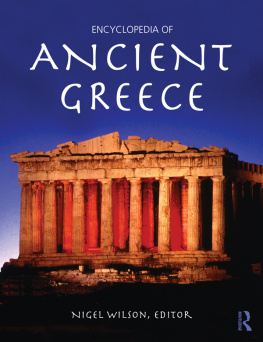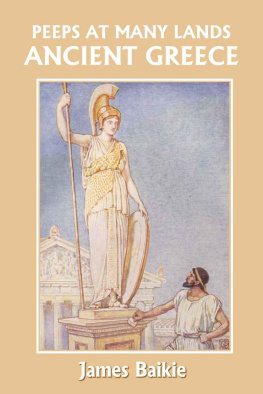David Pickering - Ancient Greece (Collins Gem)
Here you can read online David Pickering - Ancient Greece (Collins Gem) full text of the book (entire story) in english for free. Download pdf and epub, get meaning, cover and reviews about this ebook. year: 2013, publisher: HarperCollins UK, genre: Religion. Description of the work, (preface) as well as reviews are available. Best literature library LitArk.com created for fans of good reading and offers a wide selection of genres:
Romance novel
Science fiction
Adventure
Detective
Science
History
Home and family
Prose
Art
Politics
Computer
Non-fiction
Religion
Business
Children
Humor
Choose a favorite category and find really read worthwhile books. Enjoy immersion in the world of imagination, feel the emotions of the characters or learn something new for yourself, make an fascinating discovery.

- Book:Ancient Greece (Collins Gem)
- Author:
- Publisher:HarperCollins UK
- Genre:
- Year:2013
- Rating:4 / 5
- Favourites:Add to favourites
- Your mark:
- 80
- 1
- 2
- 3
- 4
- 5
Ancient Greece (Collins Gem): summary, description and annotation
We offer to read an annotation, description, summary or preface (depends on what the author of the book "Ancient Greece (Collins Gem)" wrote himself). If you haven't found the necessary information about the book — write in the comments, we will try to find it.
Ancient Greece (Collins Gem) — read online for free the complete book (whole text) full work
Below is the text of the book, divided by pages. System saving the place of the last page read, allows you to conveniently read the book "Ancient Greece (Collins Gem)" online for free, without having to search again every time where you left off. Put a bookmark, and you can go to the page where you finished reading at any time.
Font size:
Interval:
Bookmark:
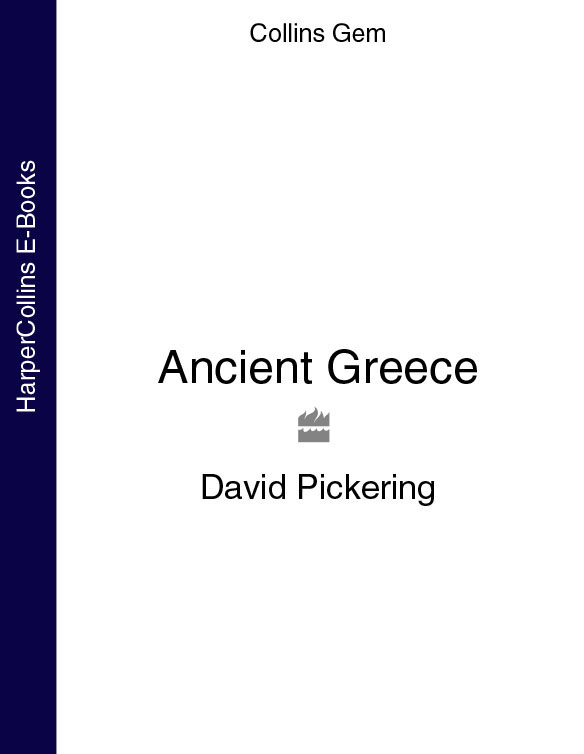
At first glance, the civilization of ancient Greece, with its ruined temples, vanished gods and age-old mythology, may seem to belong entirely to the past. Over the centuries, however, the culture forged by the ancient Greeks has had a profound influence upon the development of modern Western civilization, and in many respects their ideas and achievements remain highly relevant in the modern world.
The ideas of ancient Greek thinkers contributed greatly to the foundation of contemporary philosophy, politics, mathematics, science, architecture, literature and a host of other subjects. Even our modern languages contain thousands of words of Greek origin.
The gods and heroes of Greek mythology, meanwhile, have long been absorbed into the modern literary tradition, and continue to exert a powerful hold on the modern imagination, providing inspiration and material for a plethora of novels, plays and films.
The same may also be said of a small number of real people, such as Alexander the Great, and of the actual historical events of the period, encompassing a wide panorama of history, from the invention of democracy to the many wars that were waged both between Greek city-states and with enemies from beyond the borders of Greece.
Often described as the cradle of modern European civilization, ancient Greece continues to fascinate everyone, from archaeologists to tourists. We know a surprising amount about ancient Greece and the lives of its varied inhabitants, largely because theirs was one of the first civilizations to leave behind a detailed written and artistic record.
This book aims to summarize what we understand today about the world of the ancient Greeks, including their history, their religion and mythology, their daily lives, their culture and the wars they fought.
The Greek revival
Interest in the world of the ancient Greeks intensified in the late eighteenth and early nineteenth centuries, when it became fashionable for wealthy aristocrats and academics to visit sites in the classical world. Greek ideas were soon taken up with enthusiasm throughout the arts and sciences.
The world of the ancient Greeks extended much further than mainland Greece, with the establishment of Greek colonies throughout the Mediterranean region and the Black Sea. Greece itself was not a single united country, but a host of independent city-states that shared a common culture.

The most powerful city-state
Athens, dominated by the temple of the Acropolis, was the most important of all the Greek city-states.
Situated in the central Mediterranean, with easy access by sea to Egypt and north Africa, Asia Minor and what is now modern western Europe, Greece was positioned ideally as a centre of trade and cultural exchange. Its mountainous landscape, meanwhile, made invasion by outsiders difficult and allowed the various small city-states to develop in relative peace and largely independent of their neighbours.
Hot, dry and mountainous, mainland Greece offered little good farmland, so from an early date the Greeks explored far afield in search of places where they could grow crops to feed the population. Colonization of coastal areas throughout the Mediterranean and Black Sea region increased from around 750 BC, spreading Greek influence the length and breadth of the known world. By 600 BC, there were some 1,500 Greek colonies around the Mediterranean.
Thriving colonies were also established to the north and east, in what is now modern Bulgaria and Turkey, as well as on numerous islands in the Aegean Sea. There was also a strong Greek presence in north Africa, southern Italy, Sicily and southern France.
Everywhere the Greeks went, they took their culture with them, building temples, establishing trade links and communicating their ideas about religion, art, science and philosophy.
The Greek city-states

The Greek World
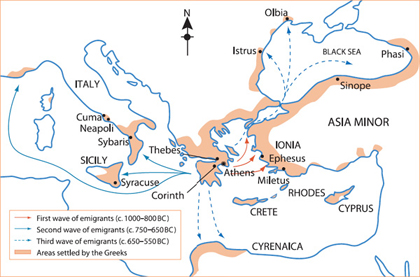
Greece was not one united country but a collection of independent city-states, all of which had their own patron gods, laws and constitutions. The first communities grew up where there was a good water supply and suitable farmland. These small communities later combined to form the first city-states, which typically included a city (usually a seaport) and the surrounding land with its villages and farms.
Each city-state (or polis hence the word politics) developed its own distinctive character. Cities were usually separated from their neighbours by mountains, valleys or the sea, which limited contact between them. However, city-states traded enthusiastically with each other and shared the same language, religion and other cultural features. Citizens were fiercely loyal to their particular state and, if called upon, would fight to defend their homeland. If attacked, citizens retreated to the acropolis (a citadel or walled area at the highest point of the city). The development of Greek civilization was regularly interrupted by squabbles between neighbouring states, although on rare occasions they allied to resist invasion by foreign armies (namely, against the Trojans in the late twelfth century BC, the Persians in the fifth and sixth centuries BC and Alexander the Great in the fourth century BC).
Populations
Aristotle believed that city-states had to have more than ten citizens but less than 100,000, as citizens needed to know the people they voted for.
Athens was the largest and most powerful of the ancient city-states. At its peak in the Classical Period, it had over 250,000 inhabitants and was a centre of culture and learning. Named after its patron, the goddess Athena, it developed around a hill called the Acropolis, which was originally a fort but later became the religious heart of the state and the site of the Parthenon and other temples.
The Athenians were responsible for many of the great advances of ancient Greek civilization, from democracy to philosophy and the theatre. It was home to celebrated philosophers, politicians and artists, and was a thriving trading centre, with business being conducted in its marketplace (the agora). The funds provided by such trade paid for the construction of many great buildings and other treasures for which Athens became famous.
Classical Athens
This map shows the layout of classical Athens with the Acropolis and Parthenon.
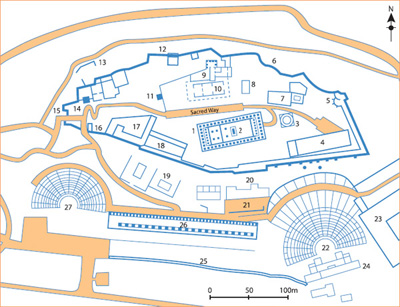
1 Parthenon
2 Statue of Athena Parthenos
3 Altar of Rome and Augustus
4 Acropolis Museum
5 Belvedere
6 Sanctuary of Eros and Aphrodite
7 Boukoleion
8 Altar of Athena Polias
9 Erechtheion
Font size:
Interval:
Bookmark:
Similar books «Ancient Greece (Collins Gem)»
Look at similar books to Ancient Greece (Collins Gem). We have selected literature similar in name and meaning in the hope of providing readers with more options to find new, interesting, not yet read works.
Discussion, reviews of the book Ancient Greece (Collins Gem) and just readers' own opinions. Leave your comments, write what you think about the work, its meaning or the main characters. Specify what exactly you liked and what you didn't like, and why you think so.


